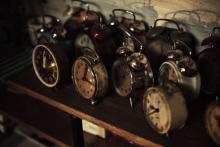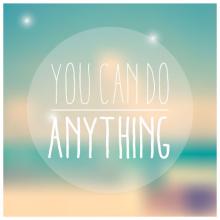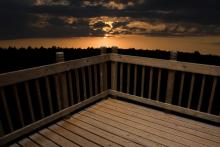busyness

AS FAR AS WE know, Nov. 18, 1883, was the only day in history to have two noons. In a move to standardize haphazard railroad timetables, the United States was divided into time zones. Major cities wound their clocks to a newly designated “noon,” suddenly separated from their neighbors into zones of “now” and “not yet.”
Some newspapers and bulletins responded with humor. “We were not so far behind as [Maine], and therefore do not need so great an advance,” one Trenton, N.J. paper joked.
But this existentially momentous event was largely observed with pragmatism. “When the reader of THE TIMES consults his paper at 8 o’clock this morning at his breakfast table it will be ... 6 o’clock in Denver, Col. and 5 o’clock in San Francisco. That is the whole story in a nut-shell,” declared The New York Times. The slight change was necessary for standardization—time zones meant progress, efficiency, growth. Who could argue?
And so there was noon, and there was noon again, on that first day.

Martha was a disciple of Jesus, and she loved, supported, and hosted him for dinner, as friends do. Yet Martha, like all of us, sometimes became bogged down by the details of her hospitality, and as a result, lost sight of the presence of the God she was serving — the God who was literally right in front of her. In my own story I, too, failed to encounter God when God was right in front of me, present in my friends, distracted as I was by the details of my hospitality.

IT WAS after midnight at the end of another long, busy day, and I had an early breakfast meeting the next morning. I decided to read a psalm before I turned off the light and, with no particular rhyme or reason, settled on Psalm 127. Although I have read this psalm before, I was completely unprepared for the shock it gave me that night.
Verse two caught me completely off guard: “It is in vain that you rise up early and go late to rest, eating the bread of anxious toil.” I was struck right between the eyes. There could not have been a more vivid and disturbingly apt description of my life and the lives of most people I know here at Sojourners and elsewhere.

While I can make things happen, contribute to long-term movement, and rally folks around a vision, I can also overwork, form my identity around the things I do rather than who I am and, in the end, miss out on the sacredness of being present in the beautiful mundane of everyday.
This is an important realization (and a hard one!) and I’m having to do a little extra evaluation of it in my current season of life with nearly four kids, a non-profit, and a household that requires the attention of a Fortune 500 CEO.
I was recently on a walk to the park with my girls Ruby (4) and Rosie (2). While I was distractedly responding to an email on my “smart” phone, I looked over and noticed that Rosie had fallen behind and was bent over staring at the ground. As I circled back around to speed her up, I noticed that she was looking at a crack in the sidewalk admiring the little twig that was sprouting between the concrete slabs.
For her, she wasn’t at all concerned about arriving at a destination, but about being fully present along the way. In this tiny twig, Rosie found beauty and she wasn’t about to miss it.

The first sign I had a problem was when I came across Candy Chang’s “Confessions” project in 2012. It was an interactive art installment on the Las Vegas strip that invited people to come in and confess their deepest secrets anonymously. Those secrets would then be added to a visual art display. It was engaging, unexpected, relevant, discussion-provoking. It was fun.
I hated it.
More correctly, I loved it; and hated myself for not actively doing something similar. I wondered how to implement a version of this idea among colleagues and in office hallways of my organization at the time; I considered “art-bombing” the streets of my city with thought-provoking questions; I spent several moments over the next several weeks seriously questioning whether I should drop everything to focus on Chang-style installations, because I could, and I liked it, and it would work, so I should be doing it. Nothing else I was currently doing mattered. Not without this one thing more.
Welcome to an exhaustive (and exhausting) self-talk: the fixation on never doing enough. Until very recently, I thought this way almost all the time. Somehow — accidentally, almost imperceptibly — years of nurturing my professional and creative pursuits was nurturing something else, as well. It became nearly impossible for me to see work that I admired and appreciated and to not simultaneously think, “I should be doing that, too.”
Which is, simply put, raging covetousness.

I’ve often heard that Lent is a season of slowing down. Of drawing closer to God, to others, to the wide open world around us. A time for spiritual reflection and inner examination. An opportunity to go a little deeper in trying to figure out Jesus. A time to pause. A time for simplicity.
This Lent, I decided to get back into biking to and from work (in addition to cold showers and placing a penny in the “Suck it Up or Shut Up” jar each time I catch myself complaining).
When I moved across town in June, I said I’d bike once I found a good route, but I weaseled my way out of it for reasons such as having to bike through some sketchy areas by myself, something I was a bit fearful of.
Now a few days into it, I’ve found a route and a rhythm. I got off to a rough start the first day of Lent, biking home drenched by the down-pouring rain. Two cars didn’t see me, causing me slam on the brakes, skidding in the middle of an intersection. Cars passing by splashed water up against me like a small ocean wave. It was cold. It was dark. And I kept making wrong turns, making my time in the rain even longer. I had a “shake your fist at God” moment, muttering things that warranted pennies in the jar, and then managed to put my sopping wet hand back on the handlebar. I thought about the journey that women in Africa make to and from water wells and firewood piles on a daily basis, often risking the possibility of getting raped just to gather these essentials for their families. Surely, I didn’t have it so bad.
And most of us don’t.